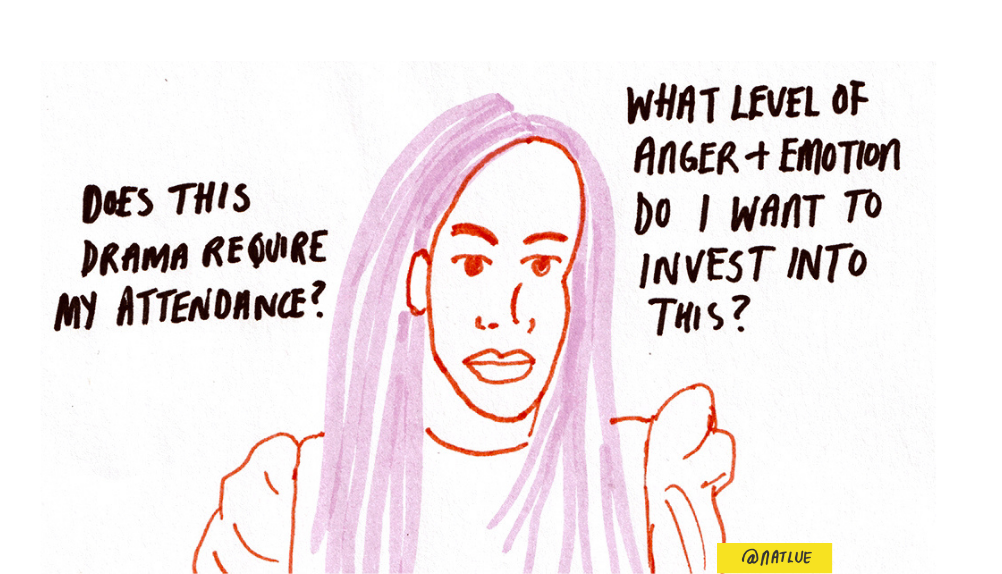An acquaintance frequently complained about their partner and their almighty rows over everything from using the ‘good towels’, forgetting to take the bins out, whose way was the ‘right’ way to do things, to how one or the other hadn’t been considerate or empathetic. And then they’d, like so many of us do, fall into the trap of arguing about how they were arguing. This person then felt baffled by her partner seeming tuned out and not taking her seriously.
So, here’s the thing: Having the same level of pissed-off-ness about, well, everything, costs us our credibility.
If we can have the same level of anger, frustration, irritation, upset, disappointment and displeasure about the minor things as we do about the major, our expression of these starts to lose meaning. It’s like when my mother uses the word “hate” to describe not liking something. Well, if you hate everything, you hate nothing. That doesn’t mean you don’t feel something about those things, it’s just not hate.
Of course, having the same response to everything stops us from, not just looking too deeply at what upsets us but also our own behaviour. We also don’t have to interrogate what we’re really angry about. After all, if everything someone does wears down our last nerves, trying to, for example, master the art of getting them to do things ‘our way’ isn’t the solution to what we see as the problem. The real issue here is that we’re annoyed about something else that isn’t being expressed and addressed, or we’re using getting angry as a distraction or as a way to feel heard or connected.
How we respond to issues, including how much we feed our anger, needs levels.
If you imagine your anger responses (feelings, thoughts and actions) on a scale of 1-5, with level one being a little annoyance, irritation, etc., but it passes or it’s not something that warrants further investment, to level five being get in formation and take action, let rip, blow the house off things or whatever, not everything that gets on your nerves or even pisses you off needs a level-five response. It doesn’t.
Thoughts precede feelings which impacts subsequent thoughts, feelings and actions, of course. Sure, you can’t help your instinctive emotional response to something–your initial feeling–but you can help how you continue to respond to it. And that’s driven by the story you tell you and how you respond to the situation.
Feeling anger, someone disappointing you, not feeling in control of how things are done or going down, doesn’t have to be your emotional touchpaper. You don’t have to feed anger with stories and even righteousness. And, no, not everything needs to be escalated to Level Five.
At the same time though, not everything can be tagged as Level One. That’s just code for suppressing and repressing your needs, desires, expectations, feelings and opinions–people-pleasing–and you will erupt one day. Conflict is a healthy part of relationships; it’s the communication and pattern of it that can become problematic.
Setting levels to how you respond to, not just to your anger but to situations that present themselves, allows you to pick and choose your battles.
You don’t have to attend every potentially ‘negative’ situation you get invited to. Some things can just mosey on by and land on someone else. Or not be a thing. It’s also, especially when it comes to relationships you respect and value, not about ‘winning’ and being ‘right’. If you always have to be right, everyone else has to be wrong or obedient. It’s not about who’s right but about what’s right for the relationship.
Work out what your anger-response levels are, and tweak and refine as you go.
Clearly, if something rates as a two or below, it doesn’t need anger investment. You can consciously choose how to proceed and steer away from rehashing or feeding it. Notice if there’s something that needs to be said or done. What can you do to take care of you? Or, what needs to happen so this doesn’t become a three-plus?
If something is a three, that’s an opportunity to get grounded, be mindful of the story you’re telling you, and pay attention to what’s going on. Be open to more information making itself known. It may well be that you reduce or increase the level, but at least it’s from an informed place.
Levels four and five require action. It’s down to you to put some clear differentiation between the two. Every person’s idea of what constitutes these is personal, so get honest about what doesn’t work for you.
If you notice that you keep trying to categorise everything as one particular level, get grounded. What are you avoiding?
Not everything needs your bandwidth, but everything needs your boundaries.

 Add to favorites
Add to favorites 
